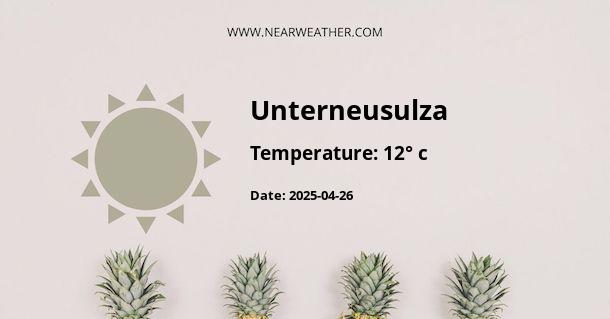Unterneusulza, Germany: A Detailed Look at Its Climate and Weather Patterns
Unterneusulza, a locale found within the bounds of Germany, is characterized by a climate that broadly categorizes under the Oceanic climate (Cfb) in the Köppen climate classification system. This climate is distinguished by the presence of temperate and generally moist conditions year-round, with an absence of extreme temperatures both in summer and winter. In this detailed examination of Unterneusulza's climate and weather patterns, we will delve into monthly temperature averages, precipitation trends, and examine the climatic factors influenced by its geographic location within Germany.
Geographical Influences on Climate
Unterneusulza's climate is significantly influenced by its geographical position within Central Europe and proximity to large water bodies such as the North Sea and the Baltic Sea. These large bodies of water work as climate moderators, ensuring mild winters and cooler summers compared to areas farther inland.
Temperature Overview
The temperature in Unterneusulza fluctuates throughout the year, with cold winters and warm summers. Here, we will provide a chart showcasing the average high and low temperatures for each month.
"Unterneusulza experiences a wide range of temperatures that reflect the continental influences as one moves away from the coastal regions – this diversity is a quintessential element of the regional climate." - Local Meteorology Expert
| Month | Average High (°C) | Average Low (°C) |
|---|---|---|
| January | 2 | -3 |
| February | 4 | -2 |
| March | 8 | 0 |
| April | 14 | 4 |
| May | 19 | 9 |
| June | 22 | 12 |
| July | 24 | 14 |
| August | 24 | 14 |
| September | 19 | 10 |
| October | 14 | 6 |
| November | 7 | 2 |
| December | 3 | -1 |
Precipitation and Humidity Patterns
Rainfall in Unterneusulza is fairly consistent throughout the year with no distinct dry season. A blend of Atlantic fronts and continental airstreams influences the amount and intensity of precipitation. The following is a breakdown of the average monthly precipitation levels.
| Month | Average Precipitation (mm) |
|---|---|
| January | 40 |
| February | 35 |
| March | 40 |
| April | 45 |
| May | 60 |
| June | 70 |
| July | 80 |
| August | 70 |
| September | 55 |
| October | 50 |
| November | 45 |
| December | 50 |
Additionally, humidity in Unterneusulza remains relatively high throughout the year due to frequent precipitation and the area's overall climate type. This humidity can influence the subjective feeling of temperature, often making cooler days feel colder and warmer days feel more oppressive.
Wind and Storm Patterns
Given its position in Europe, Unterneusulza can be affected by various wind patterns, including westerlies which often bring wet weather systems. The area can also be susceptible to storms, particularly in late summer and throughout autumn when Atlantic low-pressure systems are more likely to affect the region.
- Westerly Winds: Predominant during the year, responsible for the moisture-laden climate.
- East Winds: Can bring colder, drier air from the Eurasian continent during winter.
- Storm Activity: Tends to peak during transition seasons like autumn, less common in winter and spring.
Seasonal Climate Variations
Each season in Unterneusulza presents its own climatic characteristics. Let's explore these patterns in a seasonal breakdown.
- Spring (March-May): This season sees a gradual increase in temperature and daylight hours. Spring is also characterized by a moderate amount of precipitation.
- Summer (June-August): Summers are warm with long daylight hours. Rain is prevalent in this season, with occasional thunderstorms.
- Autumn (September-November): Temperatures begin to cool down, and the leaves change color. This season is known for its storm potential and increased wind activity.
- Winter (December-February): Winters are cold with the shortest daylight hours. Snowfall can occur but is generally not excessive, and precipitation is at its lowest compared to other seasons.
Climate Change Considerations
The impacts of climate change are relevant when discussing the weather patterns of any region. In Unterneusulza, like much of Central Europe, there have been recorded shifts in the climate. These changes include noticeable increases in average temperatures, variations in precipitation patterns, and the occurrence of more extreme weather events.
"There is evidence of shifting climate patterns in Unterneusulza that mirror larger global trends. These changes are expected to continue and possibly intensify, affecting different aspects of regional weather." - Climate Change Analyst
Conclusion
In conclusion, Unterneusulza experiences a climate that is variable and influenced by both its continental and oceanic surroundings. Understanding these patterns is crucial for residents and businesses alike, enabling better preparation for the diverse weather conditions experienced throughout the year. With climate change, these patterns are evolving, demanding continuous monitoring and adaptive strategies for the future.
A - Unterneusulza's Latitude is 51.116669 & Longitude is 11.666670.
A - Weather in Unterneusulza is 8° today.
A - Climate Conditions in Unterneusulza shows broken clouds today.
A - Humidity in Unterneusulza is 79% today.
A - Wind speed in Unterneusulza is 11.95 km/h, flowing at 195° wind direction. today.
